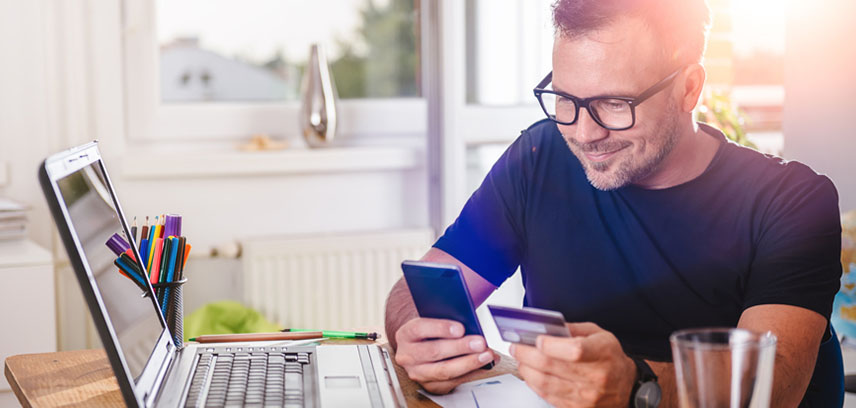
Online Banking Tips
Online banking is a great way to save you time and hassle. Of course there are some things you still have to do in person at the bank, particularly if it requires a signature, but the vast majority of your banking can be done without leaving the house, driving to the bank, waiting in a queue, and explaining your transaction needs. Being able to pay bills, transfer money, view statements, and check your account balance in real time at the click of a button in the comfort of your own home is tremendously convenient.
The Balance have listed some tips for online banking, to stay safe and have a hassle-free experience:
1 - Pay your bills online
This is one of the most widely used features of online banking, and it does exactly what the name suggests - it gives you a central place to pay all your bills at once. You can see exactly when the payment was sent from your bank and received by the payee. You can also take actions to ensure your cheque never gets lost in the post by choosing to go digital instead.
2 - Link your accounts
If you have a current account, or savings account held at the same banking institution, you can link them all to one account. That way you can view balances all at once and easily move money between your accounts.
3 - View your transactions
Having online and also mobile access to your bank account ensures you can continuously monitor your outgoings. By having this information at your fingertips on your mobile or tablet, you can find ways to manage your money better. Be sure to check this regularly to keep an eye out for any suspicious activity. Steps like this ensure you keep your credit or debit card details and information safe.
4 - Transfer money across accounts
With the introduction of online banking, transfers are now quicker and more friction-free for customers. So now you can send your friends and family money faster than ever! Remember to keep their account details safe when making a transaction.
5 - Protect yourself online
Closely monitor your account and take appropriate measures to ensure you have made everything impossible for hackers. Taking steps such as accessing the internet on a secure network, having your own email address, being mindful about your bank card safety and entering competitions are just some important ways to avoid potential cyber criminals.
6 - Download your statements
The days of printing and being sent bank statements are very much behind us. You can now simply download an electronic copy of your monthly statement and save it in a special file on your computer to refer to later, if needed. If you have a Plan with Foresters Financial, you can request to have your correspondence sent to you in an electronic format, rather than by post. Please contact us if you would like your future statements to be paperless.
At first the idea of doing something so important using the internet may seem a bit daunting and maybe even a little scary, but there are ways to keep your accounts safe and secure while you’re online.
At Foresters Financial, you can manage yours or your child’s Plan online 24/7 with MyPlans. Find out more about managing your savings through MyPlans >
Some more tips for you
As well as understanding online banking and the advantages that come with it, knowing how to use your digital banking services safely and securely is key.
Naked Security have some great tips for safer online banking:
Create a strong password
Your bank will require you to create a password to access your online accounts. Make sure it is a strong password that would be difficult for someone to guess. Don’t, for example, use your date of birth, address, name or telephone number as a password. Do use a mix of upper and lower case letters, numbers and special characters.
Keep your computer secure and up-to-date
Security software is essential for keeping your online activities safe. Make sure you have a firewall turned on and are running antivirus software, and always keep your operating system and other software up-to-date to ensure that there are no security vulnerabilities.
Be email savvy
No banks or financial service organisations will ever send you an email asking you to provide your personal login information. If you get an email like this, it is most likely a phishing attempt designed to get you to hand over your credentials. Report the email to your bank then delete it. Similarly, it is best practice to access your online account by typing your bank’s URL address directly into your web browser yourself. That way you’ll know for sure you’re accessing the real site. Never click a link that has been sent to you in an email, even if it looks as if it has come from your bank. Remember, your bank will never ask you to disclose your PIN number or passwords, so never give them out if you are called or emailed by someone claiming to be from your bank.
Do your banking from the comfort of your own home
It’s best to do your online banking from a computer and network you trust. You should always log out (most will time you out anyway), but especially ensure you do this if you use a shared computer.
Keep your eye on things
While online banking is safe if you follow sensible precautions, it’s always wise to monitor your bank statements to make sure no suspicious transactions have been made. With online banking there’s no need to wait until the end of the month - you can check your accounts 24/7! And if something doesn’t look right, contact your bank immediately.
For more information and advice on how to safely bank online, visit Get Safe Online.




